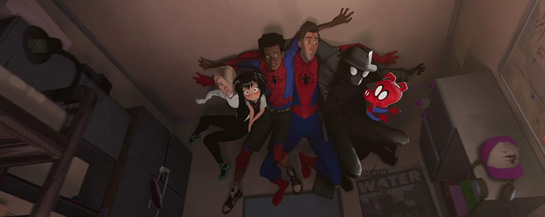|
|
Movie Review - Spider-Man: Into the Spider-VerseBy Matthew HuntleyDecember 13, 2018
The plot thickens once Miles makes contact with the original Spider-Man, who’s in a heated battle with the Green Goblin and, shortly thereafter, the crime lord Kingpin (Liev Schreiber), who’s built a giant mechanism that, for all intents and purposes, disrupts the time-space continuum and opens a portal to parallel universes (his motivation for constructing such a device is something I’ll let you discover). Without giving too much of this increasingly layered plot away, Miles’ own dimension suddenly becomes inhabited by five other Spider-People, including an older, out-of-shape and recently divorced Peter “B.” Parker (Jake Johnson), who reluctantly becomes Miles’ mentor; Spider-Gwen, the aforementioned female version of the hero; Peni Parker (Kimiko Glenn), a Japanese school girl who operates her own spider robot called “SP//dr”; Spider-Man Noir (Nicolas Cage), a dark version of Spider-Man who, with his black trench coat and fedora, resembles Rorschach from “The Watchmen”; and Peter Porker/Spider-Ham (John Mulaney), an anthropomorphic pig. Yes, a pig. Research tells me each of these alternate versions of Spider-Man actually has his or her roots in various Spider-Man comics and/or video games, which surprised me because I just assumed they were created specifically for this film. Nevertheless, “Into the Spider-Verse” provides them each a worthy backstory and pools them together to thwart Kingpin and his chief engineer/partner-in-crime, Dr. Livia Octavius, a.k.a. Doc Ock (Kathryn Hahn). With so many characters and an impressively intricate plot, the movie is surprisingly coherent and builds into a rich, action-packed adventure with strong moments of character development; witty, self-deprecating humor; and even true, heartfelt emotion. “Spider-Man: Into the Spider-Verse” is nothing if not well-rounded. The film’s most striking feature, of course, is its animation, which is virtually boundless and allows the action to move with the kind of fluidity and freedom that only animation can provide. The filmmakers have utilized their resources to a full and mesmerizing degree, filling all corners of the screen with vibrant colors and often dazzling set pieces (as far as computer-animated set pieces go). And despite this being computer animation, the characters possess full weight and dimension, thanks in large part to the fitting and memorable voice casting, particularly Moore as Miles, Henry as Miles’ father, and Ali as Uncle Aaron. They prove they don’t just enliven live-action characters but have just as much presence as the voices of animated ones. If I could change anything about “Spider-Man: Into the Spider-Verse,” it would be the main conflict, which, after an energetic setup, eventually settles on a mostly traditional superhero plot. You know the drill: the good guys must defeat the bad guys in a limited amount of time; and the main hero must learn to accept the things he cannot change, harness his powers, and rise above his own personal feelings and insecurities to fight for the greater good. This has become the sort of “go-to” Spider-Man story, which was my underlying problem with the otherwise fine “Spider-Man: Homecoming.” And while I understand a big-budget animated feature such as this probably needed to tread familiar territory before it can venture too far on its own, I also couldn’t help but think that with everything this film has at its disposal, both technically and casting-wise, it had potential to be a near-masterpiece, if only the plot taken more of a gamble and introduced problems to Miles and company that were less predictable. Still, I did appreciate the film for at least being aware of its own exhausted devices and tropes and how it even had the nerve to poke fun at some of them, including the famous, “With great power comes great responsibility” line. This attitude made me think that if the film does well enough and there’s a sequel, the filmmakers will feel they can break new ground narratively as much as they have visually. Regardless of my minor reservations about it, “Spider-Man: Into the Spider-Verse” is a splendid treat, and both ardent and casual fans of Spider-Man should find it thoroughly engaging, humorous and touching. It takes the cinematic incarnation of Spider-Man as we know it and points it in a much-needed newer direction, while at the same time it helps solidify the idea of diversity in mainstream superhero movies as the new norm. Above all, though, it’s just enormously entertaining, and despite how prolific superhero movies have become, particularly those about Spider-Man, the filmmakers have not taken for granted the bare essentials it takes to make a good movie—name character, story and heart, all of which “Into the Spider-Verse” shows off to great effect.
|

|
|
|

|
Friday, April 26, 2024
© 2024 Box Office Prophets, a division of One Of Us, Inc.


